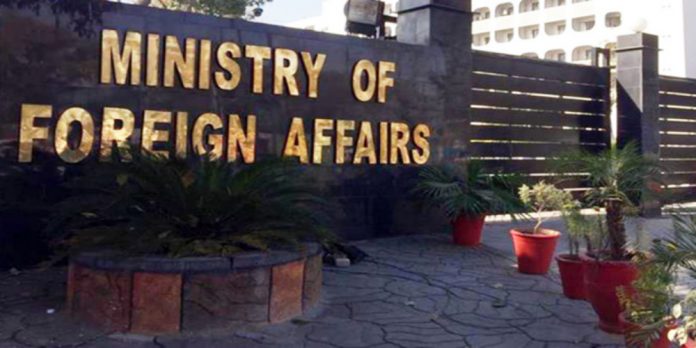By Asghar Ali Mubarak
ISLAMABAD: Foreign Office (FO) spokesperson Mumtaz Zahra Baloch said on Wednesday that Canadian accusation of Indian involvement in a separatist Sikh leader’s killing on its soil showed New Delhi’s “network of extra-territorial killings” had gone global, state broadcaster Radio Pakistan reported.
Canada’s allegation, centring on the killing of Sikh separatist leader Hardeep Singh Nijjar in June in Sur-rey, was made on Monday, with Ottawa expelling India’s top intelligence agent over the matter.
Nijjar supported a Sikh homeland in the form of an independent Khalistani state and was designated by India as a “terrorist” in July 2020. He had denied those charges, according to the World Sikh Organi-sation of Canada, a nonprofit organisation that says it defends the interests of Canadian Sikhs.
Canada said it was “actively pursuing credible allegations” linking Indian government agents to the murder of the Sikh separatist leader.
Meanwhile, PM Justin Trudeau said in an emergency statement to the House of Commons that any involvement of a foreign government in the killing of a Canadian citizen was “an unacceptable violation of our sovereignty”.
He has also demanded that India treat with “utmost seriousness” the bombshell revelation of its probe into the murder.
In response, India expelled on Tuesday a Canadian diplomat with five days’ notice to leave the coun-try.
New Delhi also dismissed the Canadian accusation as “absurd and motivated” and urged it instead to take legal action against anti-Indian elements operating from its soil.
The matter was brought up during a press briefing in Islamabad where the FO spokesperson highlight-ed that the Indian intelligence agency, Research and Analysis Wing (RAW), had been “actively involved in abductions and assassinations in South Asia” the Radio Pakistan report said.
It quoted Baloch as saying that Pakistan had remained a “target of a series of targeted killings and es-pionage by RAW”.
“In December last year, Pakistan released a comprehensive dossier providing concrete and irrefutable evidence of India’s involvement in the Lahore attack of June 2021. The attack was planned and exe-cuted by Indian intelligence,” she said, adding that in 2016, a high-ranking Indian military officer Kulbhushan Jadhav confessed to his involvement in directing, financing and executing terror and sabo-tage in Pakistan.
She termed “India’s assassination of a Canadian national on Canadian soil a clear violation of interna-tional law and the UN principle of state sovereignty”, according to the report.
“It is also a reckless and irresponsible act that calls into question India’s reliability as a credible interna-tional partner and its claims for enhanced global responsibilities,” she added.
Replying to a question about statements by Indian civil and military leadership against Pakistan, she said Pakistan had the capacity and will to defend itself.
“It has done in the past and it will continue to do so.”
‘Not surprised’
Earlier, Foreign Secretary Syrus Qazi said Pakistan was not surprised by the Canadian accusation and the world must recognise the ways of the country it considered “a supposedly indispensable ally”.
Qazi’s remarks came during a Tuesday night press briefing at the United Nations Mission in New York, where he is accompanying interim Prime Minister Anwaarul Haq Kakar to attend the 78th UN General Assembly session. “We are aware of the nature of our eastern neighbour, we know what they are ca-pable of … so it is not a surprise for us.
“We caught [one of their] serving naval intelligence officers on our soil. He is in our custody and admit-ted that he came here to create instability and spread evil,” he said when asked for a comment on the allegation levelled against India.
“There must be some truth to the Canadian premier’s allegation, that’s why they levelled it,” he said, adding that the situation was developing, “but going by our experience, we are not surprised”.
Answering a follow-up question, the foreign secretary maintained that most of the time, Indian in-volvement was found in instability in Pakistan. “Kulbhushan Jadhav] is a living example of it, and the world needs to know,” he added.
In response to a question about conflicts with India, Qazi refused that Pakistan’s responses had been defensive.
“If there is any country that understands India correctly, that’s us. And we are the only country in many respects that is not afraid of India,” he further stated, highlighting that Pakistan had been reso-lutely protecting its freedom against a rival country 60 times bigger in size.
“We have been doing this for the past 70 years … and will do it again when the need arises.”
Again referring to the India-Canada row, he added, “This is no surprise for us, but the world must real-ise what are the ways of the country they have made their supposedly indispensable ally.”
The row over the Sikh leader’s killing is the latest in an escalating row between India and Canada.
There were signs of a brewing crisis before PM Trudeau revealed the probe into Nijjar’s death on Monday.
Modi had expressed “strong concerns about continuing anti-India activities of extremist elements in Canada” during his meeting with Trudeau at the G20.
Canada had also suspended negotiations for a free-trade agreement with India, and last week its trade minister cancelled a trip to the country planned for October.
Today, India warned its citizens against visiting parts of Canada, the latest salvo in a diplomatic row over allegations that New Delhi was involved in Nijjar’s killing.
Without explicitly referring to the row, India’s foreign ministry said it was concerned for the safety of its citizens in Canada because of “politically condoned hate crimes and criminal violence”. –Agencies




